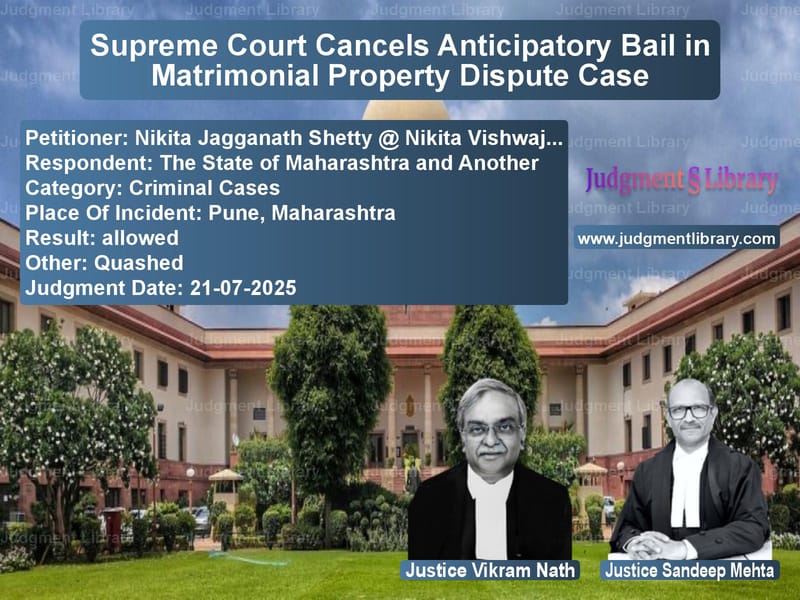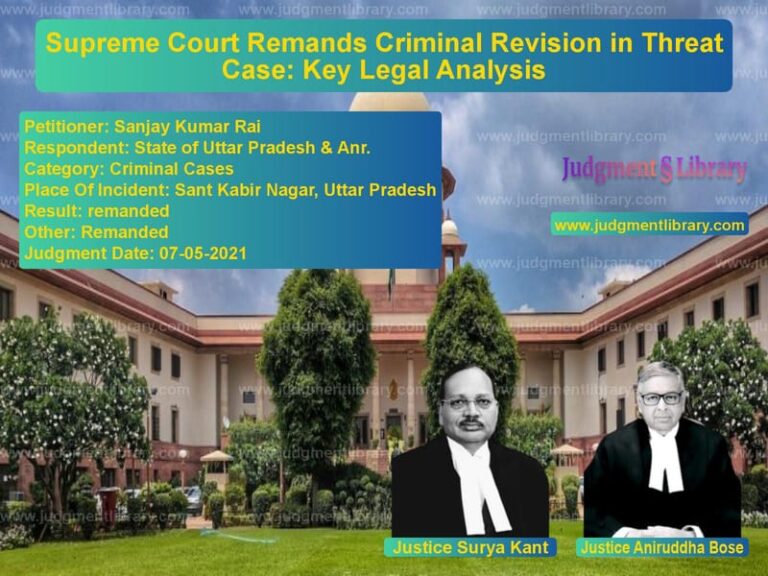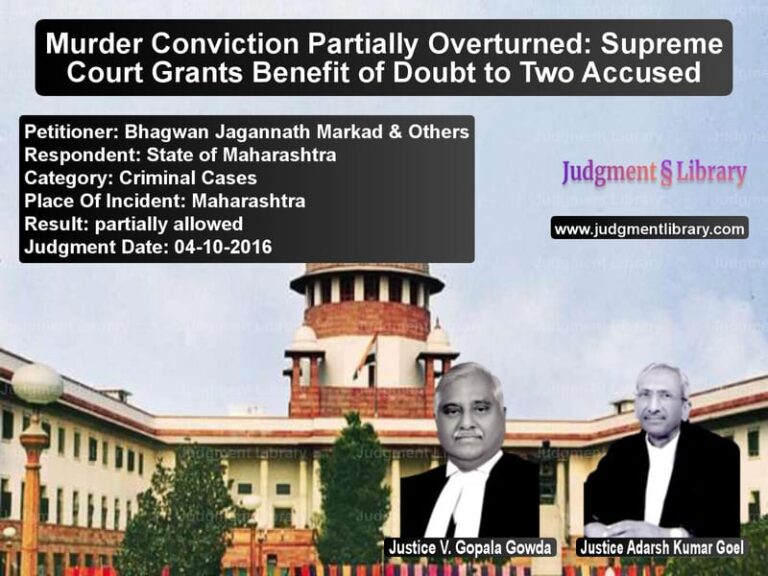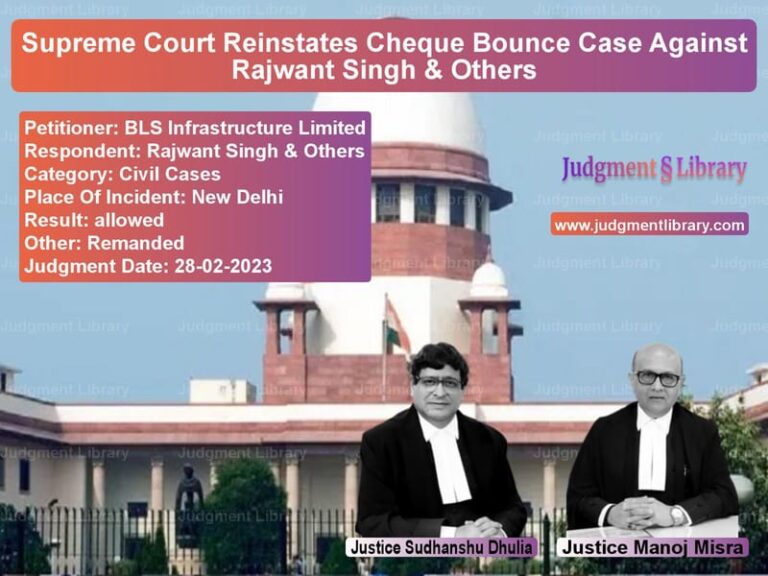Supreme Court Cancels Anticipatory Bail in Matrimonial Property Dispute Case
In a significant ruling that reinforces the exceptional nature of anticipatory bail, the Supreme Court of India recently delivered a judgment that underscores the importance of careful judicial discretion in granting pre-arrest protection. The case involved Nikita Jagganath Shetty, a woman fighting to protect her inherited property from her estranged husband and his associates, who had been granted anticipatory bail by the Bombay High Court despite serious allegations against them.
The legal battle began when Nikita Shetty filed Crime No. 1-103 of 2023 at Deccan Police Station, Pune, against her husband Vishwajeet Vinaykrao Jadhav and other accused persons. The complaint alleged that these individuals had conspired to forcibly take possession of Hotel Vaishali, a property that Nikita had inherited from her father after his demise. The couple, married on January 1, 2018, had been experiencing matrimonial strife, which escalated into a serious property dispute.
The prosecution’s case revealed that Vishwajeet Jadhav had managed to procure a power of attorney and a gift deed for the hotel executed in his name. When Nikita filed an FIR against him and his family members on June 19, 2023, at Shivajinagar Police Station, Pune, the matter took a dramatic turn. Vishwajeet filed Civil Suit No. 1248 of 2023 and obtained an ex parte interim injunction in his favor on June 27, 2023.
Armed with this court order, Vishwajeet, along with his companions, forcibly trespassed into the hotel premises owned by Nikita. The accused caused extensive damage to the property, including disconnecting the CCTV system, cutting DVR wires, and vandalizing the interiors. This led Nikita to register FIR Crime No. 1-103 of 2023 on June 29, 2023, alleging offenses under Sections 143, 147, 149, 323, 387, 427, 452, 504 and 506 of the Indian Penal Code.
The accused respondents, anticipating their arrest, approached the Sessions Court in Pune seeking pre-arrest bail. Meanwhile, Nikita successfully challenged the ex parte interim order in Civil Misc. Appeal No. 254 of 2023 before the District Judge, who set aside the injunction on August 17, 2023. The Additional Sessions Judge, Pune, rejected the anticipatory bail applications on August 25, 2023, noting that Vishwajeet had concealed the material fact that the ex parte injunction order had been set aside.
Despite this rejection, the accused respondents approached the Bombay High Court, which granted them anticipatory bail through its order dated June 19, 2024. This decision became the subject of challenge before the Supreme Court through special leave petitions filed by Nikita Shetty.
The State of Maharashtra filed a counter affidavit supporting Nikita’s plea and leveling grave allegations against the accused respondents. The affidavit revealed that Vishwajeet had threatened an employee of the hotel, leading to registration of Non-Cognizable Crime No. 283 of 2023. Additionally, Crime No. 167 of 2023 had been registered against Vishwajeet for offenses under Sections 406, 403, 420, 467, 468, 471, 120-B read with Section 34 IPC, relating to misuse of power of attorney and securing a loan of Rs. 5 crores by mortgaging the hotel using duplicate documents.
The Supreme Court, comprising Justices Vikram Nath and Sandeep Mehta, heard arguments from the appellant-complainant and the State. The accused respondents, though duly served, chose not to appear before the Court.
In its judgment, the Supreme Court made significant observations about the nature of anticipatory bail and the circumstances under which it should be granted. The Court referenced its earlier decision in Srikant Upadhyay v. State of Bihar, noting: “We have already held that the power to grant anticipatory bail is an extraordinary power. Though in many cases it was held that bail is said to be a rule, it cannot, by any stretch of imagination, be said that anticipatory bail is the rule. It cannot be the rule and the question of its grant should be left to the cautious and judicious discretion by the Court depending on the facts and circumstances of each case.”
The Court further emphasized: “While called upon to exercise the said power, the Court concerned has to be very cautious as the grant of interim protection or protection to the accused in serious cases may lead to miscarriage of justice and may hamper the investigation to a great extent as it may sometimes lead to tampering or distraction of the evidence.”
The Supreme Court found that the High Court had “clearly erred in extending the benefit of pre-arrest bail to the accused respondents.” The judgment noted that “the allegations against the accused respondents, including accused-Vishwajeet, are grave in nature” and that “the High Court seems to have glossed over this important aspect of the case and granted indulgence of pre-arrest bail to the accused respondents without considering the nature and gravity of allegations attributed to them and the fact that there was an imminent need for custodial investigation of the accused respondents.”
The Court also took serious note of the fact that “the High Court failed to notice the criminal antecedents of the accused persons, which are highlighted in the counter affidavit filed by the State.” The judgment observed that “apparently, the incident recorded in the FIR was a clear-cut attempt by the estranged husband (accused-Vishwajeet) to dispossess his own wife (appellant-complainant) from her lawfully inherited property i.e., the subject-hotel, by use of force and by employing henchmen to do the dirty work.”
Furthermore, the Court noted that “by threatening the witnesses, the accused-Vishwajeet has flouted the conditions of anticipatory bail order. For this reason, also he cannot be allowed to continue on anticipatory bail.”
In its final ruling, the Supreme Court declared: “In the wake of the discussion made hereinabove, the impugned order dated 19th June, 2024 passed by the High Court, is hereby quashed and set aside. The anticipatory bail granted to the private respondents in both the appeals is hereby cancelled. The accused respondents shall surrender before the trial Court within a period of two weeks from today. They shall be at liberty to apply for regular bail, which shall be considered as per law, subject to the right of the Investigating Officer to seek police custody/remand.”
This judgment serves as an important reminder that anticipatory bail is an extraordinary remedy that should not be granted routinely, especially in cases involving serious allegations, criminal antecedents, and potential witness tampering. The Supreme Court’s decision reinforces the principle that courts must exercise cautious discretion when considering pre-arrest bail applications, particularly when there are allegations of concealing material facts from the court or flouting bail conditions.
The ruling also highlights the vulnerability of women in matrimonial disputes involving property rights and the importance of protecting their legitimate claims against forcible dispossession. By canceling the anticipatory bail and directing the accused to surrender, the Supreme Court has ensured that the investigation can proceed without hindrance and that justice is not compromised by the grant of inappropriate pre-arrest protection.
Petitioner Name: Nikita Jagganath Shetty @ Nikita Vishwajeet Jadhav.Respondent Name: The State of Maharashtra and Another.Judgment By: Justice Vikram Nath, Justice Sandeep Mehta.Place Of Incident: Pune, Maharashtra.Judgment Date: 21-07-2025.Result: allowed.
Don’t miss out on the full details! Download the complete judgment in PDF format below and gain valuable insights instantly!
Download Judgment: nikita-jagganath-she-vs-the-state-of-maharas-supreme-court-of-india-judgment-dated-21-07-2025.pdf
Directly Download Judgment: Directly download this Judgment
See all petitions in Bail and Anticipatory Bail
See all petitions in Property Disputes
See all petitions in Judgment by Vikram Nath
See all petitions in Judgment by Sandeep Mehta
See all petitions in allowed
See all petitions in Quashed
See all petitions in supreme court of India judgments July 2025
See all petitions in 2025 judgments
See all posts in Criminal Cases Category
See all allowed petitions in Criminal Cases Category
See all Dismissed petitions in Criminal Cases Category
See all partially allowed petitions in Criminal Cases Category







